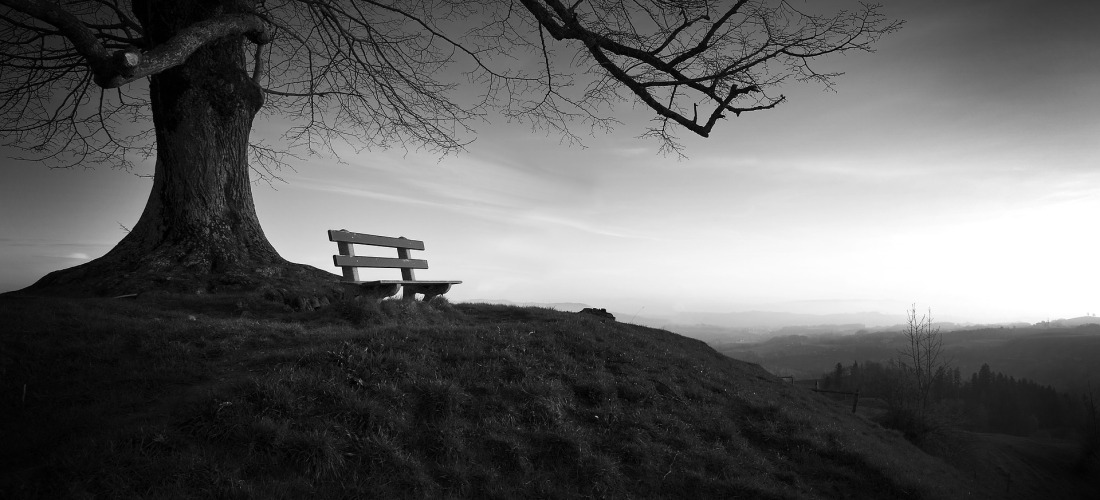Author’s Note: I’m experimenting with world building via short stories at the moment, and hoping to write a series of discrete works that take place in the same realm but don’t necessarily fit together in a sequence. This is the first of them.
Morning broke weakly, and with it the sounds of day were slowly pulled from the darkness of night. Shades of dawn slowly formed amidst the shadows, and life in the old ash tree high above the village began to rouse in sleepy chirps and warbles.
Amongst it all, a familiar shuffle and clank echoed down the empty street. There was but a single path here. No more than that was needed. The ancient lane began as a causeway in the lowest cluster of humble shanties, and gradually meandered its way upwards in a slowly tightening spiral, past row upon row of once bustling homes. But for a few inhabited exceptions, all sat silently abandoned now, the rhythmic shuffle and clank a lingering reminder of a once vibrant community.
With the sun not yet over the distant mountains, the mists held sway for a time. Yet slowly, inevitably, they began to give up their secrets. From the fading dawn fog emerged an old man and his walking stick, wearily shuffling along the damp cobblestones towards the pinnacle of the village.
Draped in a damp, brown cloak, the man periodically stopped to gingerly wipe dew from his knapsack. Then, with a deep breath, a groaning stretch, a wistful gaze upwards, the shuffle and clank would begin anew.
Nearing the peak of the town, the man smiled as the first rays of day struck the entryway to his favourite place. The living archway, woven from vines and branches, marked the sole gap in an otherwise perfectly manicured hedgerow encircling the top of the village hill.
Gazing fondly in each direction, the man breathed deeply of the complex aroma wafting from the interior of the garden, where the lingering moistness of dew intermingled with fruit, flowers, and tilled soil. Opening the thin white gate, he stepped across the threshold where the cobblestones ended and the garden’s brick path began.
Closing the garden gate softly behind him, the old man turned inwards with a smile. Across the hilltop, the morning light glistened upon the dew-laden leaves, petals, berries and brambles, and birds of all shapes and sizes had already begun to feast upon the bounty of food that lay for the taking.
Continuing his way along the path, the old man paused periodically to silently brush leaves aside that had fallen on the bricks overnight. The garden could shed as it wished, but the path was his.
Spiralling inwards, he finally arrived at his peaceful place. Reflection, contemplation, and serenity were all to be found here. A set of wrought iron chairs and a small table sat beside a fountain in the heart of the garden.
“Looks to be another beautiful day today, my heart,” the man smiled. “I’ve brought a new recipe for us to try, lavender and lily. I’m quite excited to see what you think.”
Sitting delicately down in the first chair, the man cradled his back gingerly and groaned slightly.
“That walk is not as easy as it used to be, but the view is always worth it. Wouldn’t you say, darling?”
Setting his old leather knapsack softly upon the bricks beside the table, he carefully unfastened the tassels and lovingly lifted a wrapped parcel from inside. The cloth was meticulously folded and held in place with twine, tied in a small bow.
“I bother with presentation too much, I know,” he smiled, “but our mornings together are special to me.”
Slowly untying the parcel, the old man carefully placed the looped twine and folded cloth back into his knapsack, and pulled out a porcelain tea kettle from the box, followed by two cups and saucers, a flat stone plate, a spoon, a flask of water, and two biscuits.
Surveying the cups, he pulled a handkerchief from his pocket and polished them briefly, until they too glistened in the morning light. Setting the cups and saucers on each side of the table, he placed the stone plate in the middle, lifted the lid, and poured in the water.
“I’ve been drying these leaves by our fire for the last few days now,” he remarked, deftly plucking the flowers from their stems and placing them in the kettle. “I was worried we wouldn’t have enough water for our tea, but thankfully the rain overnight has refilled our barrel.”
The old man gazed intently into the kettle to ensure he’d added an ample amount of tea, then softly closed the lid and set the teapot atop the stone plate. With a whisper and a roll of his fingers, the stone plate began to glow and the kettle was soon boiling.
“I’m sorry for resorting to magic instead of fire, love,” he said bashfully, “but I’ve grown too old to carry wood up this hill anymore. I hope you don’t mind.”
Grasping his handkerchief in one hand, he picked up the whistling pot, filled each cup to the brim, and lovingly set each place with a biscuit.
“You always were a better baker than I,” he sighed, “but I’m improving slowly. The finches certainly don’t seem to mind eating my mistakes.”
Sitting back in the chair, he lifted the steaming cup to his lips, breathed in the aroma deeply, and warmed his hands before finally taking a sip.
“Oh this is lovely, indeed,” he exclaimed. “I must write down this recipe for another day.”
The old man gazed around the garden for several minutes, silently enjoying the sounds and smells of spring, and the serenity of a well-brewed cup of tea in his beloved garden. Flitting across the branches, butterflies, and blossoms, the birds, bees and brambles, flowers, fruit and fauna, the old man finally fixed his attention on the fountain.
Ringed by the brick path, in the heart of the garden, at the pinnacle of the village stood the statue of a young couple, eternally bound in a loving embrace. The spiral he walked daily, from the fringes of the village to its peak, carried him here.
He gazed upon her with adoration and longing, and smiled wistfully. Slowly he rose from his seat, and reverently set the second cup of hot tea at her feet, softly tipping the cold contents of the cup from the previous day into the fountain.
“Enjoy the tea, my heart,” he whispered. “I’ll see you again tomorrow.”
After reassembling the contents of the parcel back in his knapsack, the old man began his slow journey home to the fringes of the village.




